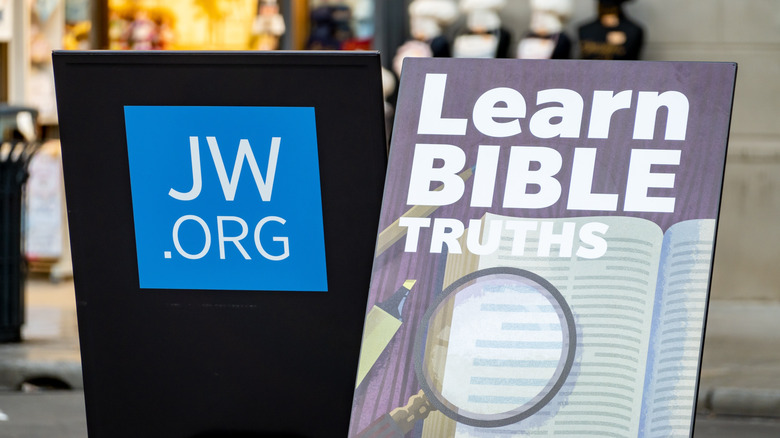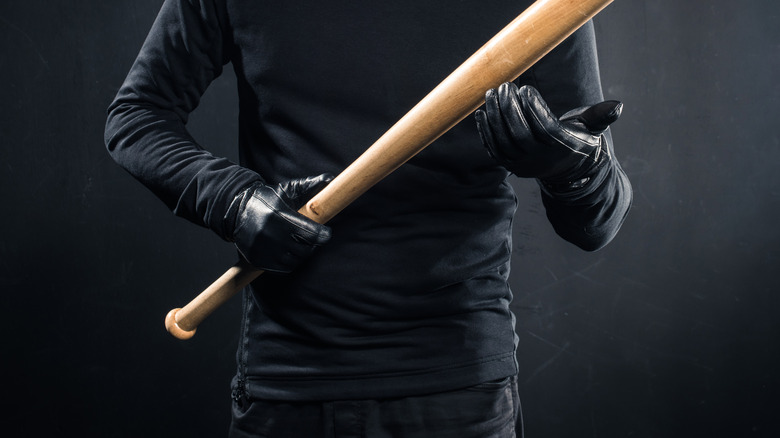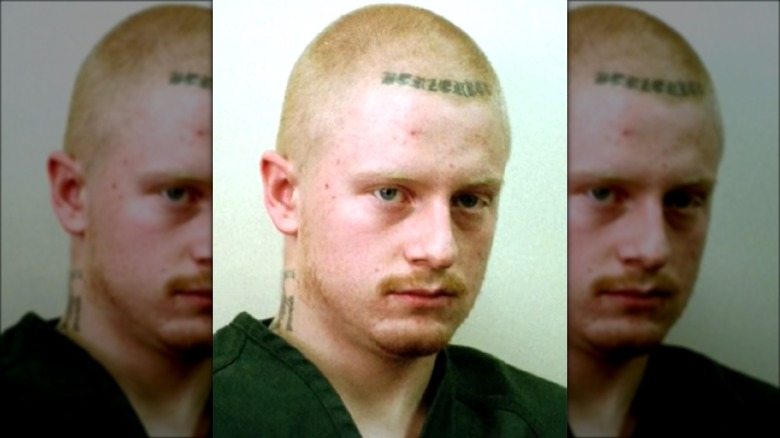Inside The Brutal Murders Of The Freeman Family
This article contains mentions of hate groups and violence.
February 27, 1995, was another average day for Valerie Freeman (via Oxygen). As she lived in close proximity to her brother's family, her nephew Erik often stopped by her house after school. When he didn't show up, Valerie went to the house to search for the boy. Instead, she encountered a harrowing scene. According to a 1995 report by the Associated Press, Valerie's brother Dennis Freeman, his wife Brenda Freeman, and their 11-year-old Erik Freeman son, were found slain in their home, located outside Allentown, Pennsylvania. Evidently, the couple's older sons, Bryan and David, were unaccounted for. When police learned the teens had a troubling history — one which included previous threats to kill their parents — authorities knew they had their suspects.
Per Newsweek, the extended Freeman family was horrified, but not shocked, by the ensuing events. Bryan and David were self-proclaimed neo-Nazis who wore their ideology proudly — even in the form of swastika tattoos. Both had documented issues with drugs and alcohol. An immediate search for the brothers began. Per Oxygen, authorities noted two more things of import: Brenda's Pontiac was missing, and the boys' cousin, Nelson Birdwell, also a skinhead, was nowhere to be found.
The manhunt led police to Michigan, per UPI. There, the Freeman brothers and Birdwell were captured at the home of Frank Hess, a known neo-Nazi. (Hess claimed he was unaware of the murders and was cleared by police.) The teenage Freemans and Birdwell were not so lucky. Blood and fingerprints tied all three to the murders.
The Freemans were a religious family
According to Oxygen, the Freeman family were devout Jehovah's Witnesses and were raised as such. Things changed for Bryan Freeman and David Freeman, however, after an alleged incident involving a dispute between their father, Dennis Freeman, and fellow congregants at their Kingdom Hall. While the inciting incident remains unclear, the matter prompted the boys to "[lose] respect for their father," as Nelson Birdwell later told the Associated Press in 1995 (via The Roanoke Times). It was not long after that David and Bryan began to rebel against their parents and their religion, prompting them to engage in drug and alcohol use.
Per The Washington Post, the situation worsened when the boys found the neo-Nazi skinhead movement, donning military garb and shaving their heads, per The New York Times. Later, Bryan and David had the phrases "Seig Heil" and "Berzerker" tattooed on their foreheads, respectively. Their grandfather told Newsweek they "looked like monsters," and reports from the time stated they garnered a reputation for preaching about racism, antisemitism, and violence (via The Roanoke Times).
Things were similar at home. The boys were aggressive and threatening towards their parents — so much so that their aunt Valerie Freeman, who lived in their family home, moved out (via Oxygen). Dennis and Brenda attempted to get professional help for their sons to no avail, per the Associated Press – and chillingly, Erik Freeman told his aunt Valerie that "you never know when you're going to die" shortly before the murders.
The Freemans were massacred
After police the Freeman house, they were astonished by the brutality of the crime scene (via Oxygen). Per The Washington Post, Dennis Freeman, Brenda Freeman, and Erik Freeman were stabbed and bludgeoned to death. Dennis and Erik were killed in their beds. Brenda, however, was discovered in the basement. Authorities note that all three were unrecognizable due to the extent of the injuries. The weapons used ranged from a baseball bat, a dumbbell, and a pickaxe handle.
According to the confession, that David Freeman gave after they were apprehended, Bryan Freeman had been the one to kill their mother, while David had killed his father and brother Erik. He also stated his cousin, Nelson Birdwell, had only been a witness (via the Associated Press). However, it was later uncovered that Birdwell had assisted David in killing Dennis, according to Oxygen. David later went on to say that Birdwell had actually been the one that killed Erik.
As for the motive? The brothers killed their parents after Dennis and Brenda had discarded their neo-Nazi writings and sold their car — the one they used to drive to skinhead meetings. Per Oxygen, more evidence for their motive came from a fellow student named Joshua Wirth, who attested Bryan had told him that "if he [Bryan] had been awake while they sold [the car], he would have killed [his parents]."
Bryan Freeman expressed remorse over the killings
In 1996, Bryan Freeman (pictured above) and David Freeman both pled guilty to the murders of their parents and were automatically given life sentences without the possibility of parole, per Oxygen. Nelson Birdwell did otherwise, and went to trial, with charges related to all three of the victims. Though the jury found him guilty in the case of Dennis Freeman, Oxygen noted he was acquitted for the murders of Brenda Freeman and Erik Freeman. (Nearly 20 years after the crime occurred, Pennsylvania's local Lehigh Valley news station WFMZ-TV noted that no one was ever actually convicted of killing Erik.)
In a 2015 interview with WFMZ-TV, two decades after the brutal slayings, Bryan expressed anguish over the crimes. "It's just sad, sad that so many people had to pay for something stupid, no matter how long it's been," he told the outlet. "Even after 20 years, it still haunts me and haunts a lot of people. It's sad." He went on to say the murders stemmed from rising tension in the household, and that he deserved to be in prison. "I definitely needed to go to prison, obviously. You know, I did a terrible thing and I absolutely deserve to be punished," added Bryan.
The Freeman murders spurred a copycat
Days after the Freeman family was murdered in 1995, WFMZ-TV noted two decades later that a married couple, George Howorth and Susan Howorth, were found murdered in their home. The suspect was none other than their 16-year-old son, Jeffrey Howorth. According to The Washington Post, the Howorth family lived only 10 minutes away from the Freemans. On the day they were murdered, Jeffrey reportedly went to school as normal. No one suspected anything was amiss.
However, when his parents returned home from work, they found Jeffrey sitting at their dining table with a shotgun in his hands. He proceeded to kill his mother and father. Hours later, Jeffrey's older brother, Steve, made the gruesome discovery. Per the local Pennsylvania newspaper The Morning Call, authorities found notes written by Jeffrey in his bedroom, one of which alluded to the Freeman victims and killers. "Those kids in Salisbury, they were cool," one note read. "They killed their parents."
Like the Freeman brothers, Jeffrey fled the scene to another state — this time, Missouri — but was found there a few days later. At his trial, the prosecution stated that Jeffrey was undoubtedly inspired by the Freeman crimes (via the Associated Press); nonetheless, the defense expressed that Jeffrey was mentally ill and insane. Ultimately, he was found not guilty by reason of insanity and was subsequently institutionalized at a state hospital. He reportedly remains there to this day.
The Freeman brothers could be resentenced
In 2016, it was announced that Bryan Freeman could possibly receive a new sentence regarding the murders of his family (via NBC Philadelphia). In 2012, the Supreme Court ruled that it was unconstitutional to sentence minors that were convicted of murder to life without the possibility of parole, per NPR. In 1995, when both Bryan and David Freeman committed their crimes, Bryan was 17 and David was 16, making the life sentences they were later handed eligible for reconsideration under these guidelines, per Oxygen. (As Oxygen also noted, Nelson Birdwell was 18 at the time of the murders, making him ineligible for the same.)
Later, in 2019, WFMZ-TV reported that David would be considered for resentencing alongside his brother. The report also stated that per Bryan's lawyer, Bryan's case was particularly strong on the basis that he could potentially be rehabilitated. Two years later, an article by WFMZ-TV insinuated that progress was slow-going for the Freeman brothers.
Adding a wrench into the mix, a ruling made by the Supreme Court in 2021 more or less voided their 2012 decision on sentencing minors to life under the constitutional premise of cruel and unusual punishment (via Slate). It's unknown how this will affect the Freeman brother's resentencing in the future, and as of 2022, there are no new updates regarding the Freeman brothers or their resentencing.





